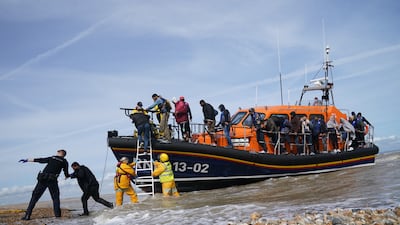The UK government has denied that asylum seekers hoping to reach the UK could be sent to Ascension Island under immigration reforms.
The South Atlantic island, which is part of a UK overseas territory almost 7,250 kilometres away, has been considered among the possible locations for offshore processing centres.
But Home Office minister Tom Pursglove said it was “untrue” to suggest the island was an option.
Under the Nationality and Borders Bill, the UK government would be able to send asylum seekers to a “safe third country” and to submit claims at a “designated place”.
This is part of efforts to create an Australian-style offshore processing system, a move that has several critics including Conservative former prime minister Theresa May.
Countries and territories including Rwanda, Albania and Gibraltar have also been considered as possible locations.
The House of Lords voted to remove these powers from the Bill but MPs reinstated them on Tuesday by 302 votes to 232.
Labour's shadow home office minister Stephen Kinnock described this as perhaps the “most unhinged” part of the Bill.
“The latest ludicrous suggestion is to use the Ascension Island, 4,500 miles away in the South Atlantic Sea. This is utter nonsense," Mr Kinnock told the House of Commons.
“It’s operationally illiterate because it’s so utterly impractical and it’s economically illiterate because it costs an eye-watering amount of taxpayers’ money.”
But Mr Pursglove said: “Just to be very clear for the benefit of the House, the suggestion around the Ascension Island is untrue.”
Former cabinet minister David Davis was among the Conservative MPs to voice concerns at the proposals.
“Asylum offshoring would be a moral, economic and practical failure," Mr Davis said. "Previous international experience shows that introducing it here will be unmitigated disaster. The first problem is an ethical one."
He told the Commons to look at “what actually happened to Australia when they adopted that approach in 2013”.
“It meant children, slavery victims and tortured survivors could be detained offshore," Mr Davis said.
“The Refugee Council of Australia has documented gut-wrenching stories of sexual, physical and mental abuse in the processing facilities.”
He said the second problem would be its “staggering cost”.
Conservative former cabinet minister Andrew Mitchell said: “We know that it would be incredibly expensive.
“Judged by the costs of Australian offshoring, the British taxpayer would face unprecedented costs per asylum seeker.
“It would be much cheaper to put each one in the The Ritz and send all the under 18s to Eton. That would cost a great deal less than what is currently proposed.
“Much more sensible to recruit and train several hundred new civil servants to process these claims more rapidly and yes, to crack down on an over-lengthy appeals process exploited through unscrupulous lawyers.”
Simon Hoare, Conservative MP for North Dorset, said of offshore processing: “It is the most dehumanising word of turning our fellow human beings into commodities that we have this idea that we can move from pillar to post.”











